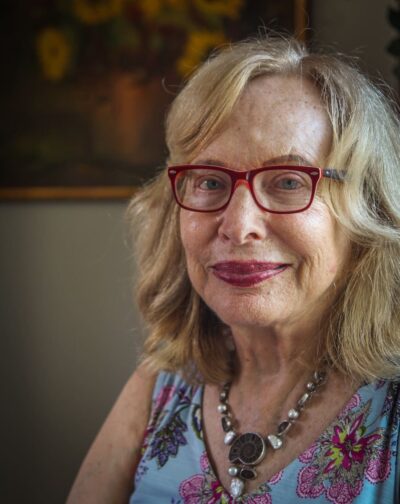In Memoriam: Glenna Luschei, 1934-2025

We at the Schooner honor the life of the late Glenna Luschei, a longtime friend of the journal. She was a wonderful poet, a tireless champion of arts and letters, and a generous spirit whose contributions to Prairie Schooner have been and will remain elemental to our continued thriving. In 1969, her words graced the Schooner for the first time. One of those early poems, entitled “The Trunk,” begins:
We scoop through the past
To the land
Where you loved
Consider this newsletter a humble attempt at excavating a few of the ways Glenna’s love for poetry impacted the world and touched the lives of countless people. For more information regarding Glenna’s incredible life, click here.
Over the years, many have pointed to a paradoxical energy animating Glenna’s extraordinary efforts. In the Winter 2004 issue of the Schooner (which contained numerous tributes to Glenna upon the establishment of the annual $1,000 Luschei Prize) Barry Spacks wrote eloquently about the multitudes Glenna contained. “I’d call her that unlikely animal: The Modest Diva… the Grandeur’s there, and the accomplishment, but without indulgence in a Grand Air,” Spacks said. “In our Age of Narcissus she keeps her eyes on the Others, especially the needy, publishing them, encouraging, serving up (Salinger) ‘consecrated chicken soup.'”
In 2014, at the 50th Anniversary Reading for Luschei’s publishing endeavor Solo Press, Luschei gave Spacks a shoutout in her brief introduction to “Leaving It All Behind,” the evening’s closing poem. “A person who helped me with this poem was Barry Spacks,” Luschei said. “In our poetry group, when others thought I was being excessive, he thought it was charming to hear this ingenue failing at everything she did.” The poem begins with the speaker climbing to pray at the Temple of the Reclining Buddha in Thailand and concludes with a playful moment of epiphany:
That’s all right. I accept my destiny. I accept that all is illusion,
everything vanishes… when I left the temple, even my shoes had disappeared.
Click here to watch Luschei’s performance of the poem.
Kwame Dawes, Glenna Luschei Endowed Editor-in-Chief of Prairie Schooner, commented on Glenna’s penchant for exploration in the short film Between Two Rivers. “She carries that interesting tension, the value of the home space, in the tradition of the prairie, but at the same time, restlessness, the desire to keep moving, to see more, to see more. I love that combination in her,” Dawes said. “She’s constantly hungry for more discoveries, and yet she’s very comfortably anchored. That self-awareness is a remarkable quality. It’s there in her poetry, and it’s certainly there in the gestures she makes in relating to people and connecting to people.”
Click here to watch Between Two Rivers.
Ted Kooser, former Poet Laureate of the United States, was another writer whose life was touched by Glenna. His second collection, A Local Habitation & A Name, was published by Glenna via Solo Press. “It was my first book to demonstrate a personal voice,” Kooser said in the Winter 2004 issue of the Schooner. “Glenna was prescient in recognizing that.” Glenna would, years later, find herself published by Kooser as part of his American Life in Poetry column. In the poem, entitled “Comings and Goings,” she writes:
You start that life in the West,
invent a past, and when that tune
winds down, it’s okay to put out,
“Take me.”
What do we have in life
but comings and goings?
Click here to read the poem in full.
Glenna’s deep and abiding appreciation for all the cultures of the world manifested in many ways. She was a translator; she had a degree in Hispanic Studies from UC Santa Barbara; she spearheaded for the Schooner a portfolio of contemporary Portugese poetry; she established the Glenna Luschei Prize for African Poetry, and much more. In the Winter 2004 issue of the Schooner, Vicki León commented on Luschei’s steadfast belief in the importance of poets from the Spanish-speaking world. “Glenna gave me hope that we would live to see the day when Latino poetry, literature, and art forms would take their rightful place in this multicultural society. Y ya vino!” León said. “And that day has come, thanks, in large part, to people like Glenna, who’ve never stopped working, with diligence y con arte, toward that goal.”
To read a selection of Luschei’s translations of 17th-century Mexican poet and nun Sora Juana Inés de la Cruz, click here.
If you’d like to experience more of Glenna’s poetry, a great starting point is the John H. Ames Reading Series, a decades-long reading series from the Lincoln Public Libraries that featured Glenna on multiple occasions. Click here to watch Glenna’s 1988 reading, click here to watch her 2010 reading, and click here to watch her in 2017 (for the 2017 event, Glenna’s reading begins at 15:40). During a brief Q&A that serves as an introduction to the 2010 video, Glenna shares her advice for aspiring writers. “A big lesson is just write in your own voice. It took me a long time to find my voice,” she said. “I do love the Prairie Schooner, because I love the voices of the poets there.”
Thank you Glenna, for your voice, and for everything you’ve done to amplify the voices of so many.